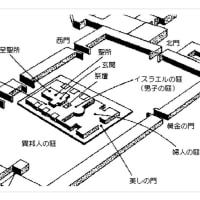145篇 主の主権と御業を思い起こす
1.文脈と背景
1節「私の神、王よ、私はあなたをあがめます。あなたの御名を、世々限りなくほめたたえます」ここに語られているように、この詩篇は、神をたたえる歌です。ヘブル語原文では、各行頭がアルファベット順に揃えられた、いわば日本では「いろは歌」と呼ばれるものになっています。ただ、アルファベットの真ん中の文字、ヘブル語ではヌーン(N)という文字の行が抜けた変則的ないろは歌なのですが、日本語の聖書ではそれがわかりません(ヘブル語のアルファベットは22文字なので、1文字抜けて21行となっています)。
さて神をたたえることは、まず、神であり王である方が、私自身にしてくださった、奇しいみわざと主権を思い巡らすところから生じるのでしょう(5節)。かつてマリヤはエリサベツに会って、自分の人生に対する神の介入とその奇しいわざに思いを巡らし、「私のたましいは主をあがめ、私の霊は、私の救い主である神をたたえます」(ルカ1:46)と神を賛美しました。ただ聖書を開き漠然と読んでいるだけでは、そこに賛美も感謝も起こりません。しかし、聖書を開き、神が自分に何をなしてくださったかを、よくよく思い巡らす時に、賛美と感謝が起こって来るのです。
2.主を証しする
それはさらに証しへと発展します。4節「代は代へと、あなたのみわざをほめ歌い、あなたの大能のわざを告げ知らせます」6、7節「人々はあなたの恐ろしいみわざの力を告げ、私はあなたの偉大さを語ります。人々はあなたの豊かないつくしみの思い出を、あふれるばかりに語り、あなたの義を高らかに歌います」大切なのは、朝毎に聖書を読んで神と心通わせ、神を証する力を与えられていくことでしょう。また礼拝に集い、神を認め、神に栄光を帰す礼拝をするたびに、宣教の民として自分が整えられていることに気づくことです。つまり、自身の心の中に語るべきものが備えられていることに気づかされることです。逆に言えば、証へ動機づけられない礼拝は、偽りです。自身の心が慰められた、励まされた、とただ満たされたことを喜び次のステップに向かわない自己満足的な礼拝は、残念ながら本当の意味での礼拝を味わってはいないのです。礼拝は、ただ神のあわれみと恵みの豊かさを与えるのみならず、11節「大能のわざを語り、知らせる」者と整えられる素晴らしい時です。
そこでもう一つ押さえておかなければならないことは、伝道は自らの経験を語るもの以外のなにものでもないことです。自分の人生に介入された神を証しするのです。あるいは自分が加わる教会に介入された神を証しするのです。となれば、わざわざ伝道ができるために、訓練を受けたり、セミナーに出たりする必要はないことはよく理解できることです。しっかり神と交わり、神が自分や教会にしてくださったことをよく理解できていれば、口頭でも書面でも自然にできるものでしょう。自分が伝道できるために、また教会が宣教的になるために特別な訓練が必要だなどと言う人は、神を体験していないと言わざるを得ません。詩人は、神が、人に多くの点で関わることを告白しています。14節「主は倒れる者をみな支え、かがんでいる者をみな起こされます」主は無力な者の支え手です。また、15節「主は時にかなって、彼らに食物を与えられます」つまり、神は悪い者にも良い者にも心を配る、気前のよい与え手です。そして18節、神は、ご自身を呼び求める者と親密な関係を持たれる方です。神は、ご自身と共に生きようとする者に配慮してくださるお方です。それらを日々のディボーションの中で、思い起こせるならば、神に対する感謝と讃美、そして証が自然に出て来るのです。の通読ブログを一緒にやってきた皆さんであれば、それがよくわかるでしょう。
3.終末的ビジョンを抱く
21節「すべて肉なる者が聖なる御名を世々限りなくほめたたえますように」、また神と時を過ごすディボーションは、終末的礼拝のビジョンへと私たちの思いを広げます(黙示録7:9)。つまりそれは、私たちが神と共に歩み、どこへ向かっているのかをはっきりイメージさせる、終末的視点をしっかり持たせる時ともなるのです。今日も、主の主権とみ業に思いを潜めて歩ませていただきましょう。では今日もよき一日となるように祈ります。
<クイズコーナー>
最初に、昨日のクイズです。詩篇に使われる並行法で、一行目と二行目が、ほぼ同じ言葉、思想で繰り返されるものを何というでしょうか?①同義型並行法、②反意型並行法、③合意型並行法、答えは①同義型並行法です。詩篇83:1「神よ、沈黙していないでください。神よ、黙り続けないでください」がそのよい例です。では、今日の聖書クイズです。詩篇の並行法で、一行目と二行目の思想が、反対、対比、または対照になっているものを何と言うでしょうか。①同義型並行法、②反意型並行法、③合意型並行法、答えはまた明日。では今日もよき一日となりますように祈ります。
1. context and background
Verse 1: "I will praise you, O King my God. I will praise your name without end for all the world." As the words suggest, this Psalm is a song of praise to God. In the Hebrew original, the beginning of each line is aligned in alphabetical order, so to speak, in what is called "iroha-uta" in Japan. However, it is an irregular alphabetical poem because the middle letter of the alphabet, the line of the letter noon (n) in Hebrew, is missing. Unfortunately, this is not evident from the Japanese or English Bibles (the Hebrew alphabet has 22 letters, so the poem is 21 lines long with one letter missing).
Now praising God comes first from contemplating the strange works and sovereignty that the One who is God and King has done for me personally (v. 5). Mary once met with Elizabeth and reflected on God's intervention in her life and His wondrous works, praising God, "My soul glorifies the Lord, and my spirit praises God my Savior" (Luke 1:46). Herein lies the purpose and meaning of devotions. I wonder if any of you have ever opened the Bible and just read it vaguely, thinking that you need to read it. Such an approach does not bring about praise or thanksgiving to God. However, when you open the Bible and reflect on what God has done for you, praise, thanksgiving, and faith in God will arise spontaneously from your heart.
2. testifying of the Lord
Such efforts also produce further testimonies: v. 4, "Generation after generation will sing praises to you and proclaim your mighty works," and vv. 6, 7, "People will tell of the power of your terrible works, and I will tell of your greatness. The people will overflow with memories of your abundant mercy, and they will sing loudly of your righteousness. Also, every time we gather for worship services, acknowledging God and giving glory to Him, our missionary thoughts will be deepened and we will be prepared for missionary work. In other words, we will realize that we have something to say in our hearts, and we will even want to say it. Conversely, worship that is not motivated by testimony is false. Worship that is merely rejoicing in the fact that one's heart has been comforted and encouraged, and not moving on to the next step, is self-satisfying and, unfortunately, is not really worshiping. Worship is not only a reminder of the riches of God's mercy and grace, but a more active way to be equipped to "speak and make known the works of the Great Commission," v. 11.
Another thing to keep in mind is that evangelism is nothing more than the telling of one's own experience. It is a testimony of God's intervention in your life. It is a testimony of the God who intervened in your life, or the God who intervened in your church. We often hear about training and attending seminars in order to be able to evangelize, but should we really do that? No. As a matter of fact, we don't have to. If you are in good fellowship with God through worship and devotions and have a deep understanding of what God has done for you and your church, you should be able to do it naturally, either verbally or in writing. For those who say that they need special training to be able to evangelize and for their churches to be missional, it is important that they first experience God personally. The psalmist confesses that God relates to man in many ways: verse 14, "The Lord upholds all who fall, and raises all who are crouching" The Lord is the sustainer of the helpless. And verse 15, "In due season the Lord will give them their food," that is, God is a generous giver who cares for both the bad and the good. And verse 18, God is the one who has an intimate relationship with those who call upon Him. God is the one who relates in his own way to those who seek to live with him. If we can remember these things in our daily devotions, thanksgiving, praise, and testimonies to God will come naturally.
3. embrace an apocalyptic vision
Verse 21 says, "May all flesh praise His holy name for ever and ever. Finally, devotions in which we spend good times with God expand our thoughts to visions of apocalyptic worship (Revelation 7:9). In other words, it is a time for us to have a firm eschatological perspective that gives us a clear picture of our walk with God and where we are headed.



















